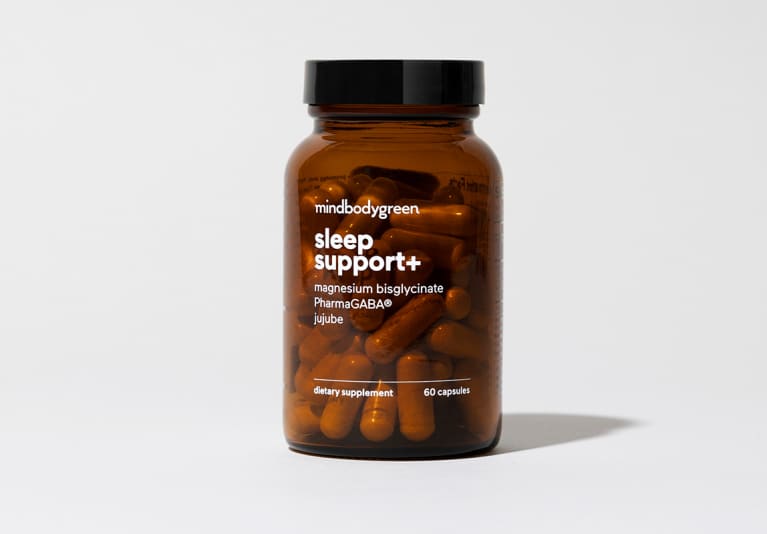
Our editors have independently chosen the products listed on this page. If you purchase something mentioned in this article, we may earn a small commission.
Alcohol is clearly dangerous to mix with medications like blood thinners, mood stabilizers, and antibiotics—but what about over-the-counter products like melatonin? Here’s what to know about how alcohol and melatonin impact the body individually, and when taken in tandem.
Many people turn to a glass of wine or two to help them relax before bed, as drinking alcohol in moderation has a sedative effect at first. However, as the night goes on, this effect wears off.
“While it can maybe help people fall asleep, it disturbs sleep—especially in the second part of the night. It’s not an effective sleep aid to turn to,” Fiona Baker, Ph.D., the Director of the Human Sleep Research Program at SRI International, says of alcohol.
That’s because as alcohol gets metabolized in the night, it disrupts essential deep sleep stages like REM sleep. Baker adds that it can also increase body temperature and heart rate, cause inadequate hydration, and lead us to need to use the bathroom—all things that will further disrupt sleep quality.
“Although alcohol makes you sleepy and might help you fall asleep, the sleep you’re getting is worse,” says sleep doctor Daniel I. Rifkin, M.D. This fragmented sleep is one of the reasons you might wake up feeling tired and groggy after a night of drinking—despite spending the same amount of time in bed as usual.
Melatonin is an increasingly popular supplement for sleep, with recent research showing that demand for it has skyrocketed over the last 20 years.
Like alcohol, melatonin is often used as a relaxant to get the body ready for bed. Nicknamed “the hormone of darkness,” melatonin is a hormone that gets synthesized in the body when the sun goes down. Using electronics and bright lighting at night, or traveling to a new time zone, can disrupt your natural melatonin production—sending your circadian rhythm, or internal clock, out of whack and causing you to feel wide awake when you want to be asleep.
Taking supplemental melatonin can help quickly reset your internal clock, making it helpful when you’re acclimating to a new sleep-wake schedule. However, there is limited evidence that melatonin supplements improve sleep quality, and it may be dangerous to take nightly—especially in high doses.
“It’s important to remember that melatonin is a hormone and using any hormone regularly can down-regulate your own production of that hormone,” integrative doctor Seema Bonney, M.D. previously told mbg. For this reason, experts agree that it is not effective as a long-term sleep aid.
Mixing melatonin and alcohol.
It turns out, neither melatonin nor alcohol will do much to improve your sleep quality—especially when combined.
“You want to avoid taking the two together,” Rifkin cautions, since alcohol has actually been shown to suppress melatonin in the body. This means that drinking (even in moderation) on melatonin can disrupt your circadian rhythm and have the opposite effect of what you want.
Besides canceling each other out in a way, Rifkin adds that “they both have a sedating effect, so taking the two together could be dangerous.” He notes that the combination can lead to dizziness and overwhelming fatigue, plus further sleep fragmentation.
Melatonin and alcohol are both processed in the liver, so combining them can also be taxing on the body—especially for those with existing liver health considerations.
Potential interactions with melatonin and alcohol:
- Dizziness
- Fragmented sleep
- Brain fog
- Increased heart rate
If you’re looking to improve sleep quality, lasting lifestyle shifts will be safer and more effective than short-term fixes (that don’t even fix much, anyway) like melatonin and alcohol.
Experts agree that one of the most important things you can do for your sleep is to get into a rhythm of going to bed and waking up around the same time every day. This will help keep your internal clock steady and reliable, and ensure melatonin production is consistent. Getting sunlight in the morning and keeping things dark (and screen-free) at night will also support your body’s natural production of melatonin.
sleep support+
The deep and restorative sleep you’ve always dreamt about*

Other habits to get into for better sleep include not eating or exercising late at night, keeping your bedroom cool, dark, and quiet, and releasing stress before bed through practices like journaling or meditation. If you do drink alcohol, experts recommend limiting it to a few drinks at least four to six hours before bed if you can.
There are also plenty of sleep aids that can replace your melatonin habit and do more to actually improve sleep quality.* Here is mbg’s list of the best non-hormonal options (we’re partial to our melatonin-free sleep support+ supplement, which contains magnesium bisglycinate, jujube, and PharmaGABA®).
If you’ve made all these shifts and are still struggling to fall asleep or stay asleep, consult with a doctor to get the root of the problem.
We can count alcohol and melatonin as things that we might think are supporting our sleep—but are actually really messing with it. These two substances are also dangerous when combined, so getting your nightly routine in check and cleaning up bedtime hygiene will be a much safer way to ensure overall sleep quality.
If you are pregnant, breastfeeding, or taking medications, consult with your doctor before starting a supplement routine. It is always optimal to consult with a health care provider when considering what supplements are right for you.

sleep support+
The deep and restorative sleep you’ve always dreamt about*
sleep support+
The deep and restorative sleep you’ve always dreamt about*

https://www.mindbodygreen.com/articles/melatonin-and-alcohol

